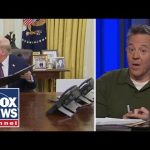At the prestigious World Economic Forum in Davos, the atmosphere took an unexpected turn when former President Donald Trump made a splash with his bold remarks. The elites gathered in their cozy corner of Switzerland seemed to experience a jolt when Trump challenged their long-standing ideas. He didn’t just dip his toes into the conversation; he cannonballed into the debate, sending waves through the audience of international bankers and business leaders. The question on everyone’s mind was clear: What were these elites truly afraid of regarding Trump?
Victor Davis Hanson, a senior fellow at the Hoover Institution, highlighted the profound unease among the Davos crowd. Trump unleashed a critique of their cherished principles—like open borders, illegal immigration, and the so-called Green New Deal, which he dubbed the “New Green Scam.” The reactions were almost comical, as bankers looked bewildered, grappling with the possibility that Trump’s ideas could benefit them. Would they get the liquid natural gas he promised? Didn’t he owe them nothing, yet here he was, ready to strike a deal? It appears that Trump’s straight-talking approach left these high-powered financiers both shocked and a bit intrigued.
In a world where leaders typically tread softly in the halls of power, Trump’s virtual appearance was worryingly casual. It was reminiscent of an informal office meeting as if he was inviting everyone in for casual banter rather than a high-stakes negotiation. This level of familiarity didn’t sit well with some in Davos, who were used to more formal engagements. Yet, the shock seemed to slowly dissipate, transforming into a grudging respect for a man who was willing to mix things up.
One of the central tensions in the gathering was the debate around digital identity and social media. Spanish Prime Minister Pedro Sanchez presented the idea of requiring real identities to link user profiles online. This notion was met with strong resistance. Trump, embodying the spirit of freedom, represented a barrier against such overreach, favoring privacy over government scrutiny. The Davos crowd, while typically advocating for control, seemed rattled by the prospect of losing an essential principle of American life—the freedom to speak without a leash.
In the audience sat those whose policies had often neglected the needs of ordinary Americans. From non-stop wars to open border advocacy, the elites had long pursued their interests at the expense of the middle class. Hanson astutely observed that while the economy may have once been measured by the number of private jets a billionaire flew, Trump shifted the focus to the everyday citizen. He pointed out that it’s not just billionaires that matter; what truly matters is whether the cleaning lady can afford a place to live. This pivot resonated, leaving the elites grappling with the reality that their traditional metrics no longer held sway.
As the event unfolded, it became clear that Trump wasn’t merely a voice in the wind; he was heralding a significant shift—the rise of populism. His magnetic presence attracted attention even amidst a sea of global power players. If this glimpse into Davos has taught us anything, it is that respect must be earned, and perhaps Trump was able to reclaim some of that lost respect. While the elites may not have fully embraced his vision, a seed of uncertainty was planted—you could almost hear the collective gulp when Trump made it clear that the interests of the American working class wouldn’t be sidelined anymore.
In conclusion, the saga unfolding at Davos isn’t just about financial policies or international relations. It’s about rekindling a spirit that focuses on people rather than elite expectations. It’s a testament to believing in nation-states and borders’ importance. Trump’s appearance served as a reminder that sometimes, an unexpected voice can bring profound change to elite discussions. And for better or worse, it looks like the elites at Davos might have to recalibrate their expectations in a rapidly shifting political landscape.




